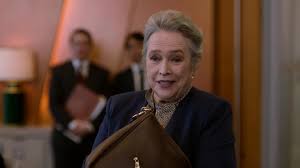Matlock Review 2024 Tv Show Series Cast Crew Online
In New York City, a man is on line at a cafe, talking on his phone about what the ceiling is of the settlement he can offer. In the meantime, and older lady is in front of him, futzing with the credit card reader. The man offers to pay for her coffee so he can get out of there.
The Gist: The woman (Kathy Bates) takes her coffee and somehow slips her way into a building on 5th Avenue, even though she doesn’t work there; she uses her Southern grandmotherly charms to get inside, including keeping extra sugars from the cafe and butterscotch candies in her purse. She manages to get into the offices of a high-powered law firm, and sneaks into a conference room for the partners’ meeting.
There, she offers up info on a big case being worked on by Julian (Jason Ritter), one of the partners. When she’s asked who she is, she introduces herself as Madeline Matlock, “like the old TV show,” she says, and goes on a ramble about how many times, especially when the show was on in the ’80s, she was asked about the old Andy Griffith series. She’s there because she applied for an associate’s position but hadn’t gotten a callback. Given her age, she could cite them for discrimination. But she also has info about the big case, due to her placing herself on a cafe line in front of the opposition’s lawyer.
The firm’s owner (Beau Bridges) hires her, and Julian tells “Matty” that one of the other partners, Olympia Lawrence (Skye P. Marshall), needs another junior associate to help her in a wrongful-conviction lawsuit that’s stalling.
Olympia isn’t happy that she’s being saddled with Matty, who says she hasn’t practiced law since 1991, but she introduces her to “you two,” her name for the two junior associates — Billy (David Del Rio) and Sarah (Leah Lewis) — who have been toiling away on the case. She also tells Matty to “get Thanksgiving” to get on her good side. Matty figures out that Olympia is in the middle of a divorce and wants her kids on the holiday — and her soon-to-be-ex is Julian, the son of the firm’s owner.
Olympia has yet to find a former prostitute that can provide the “smoking gun” in the lawsuit, which would prove that her client’s wrongful conviction was a result of police corruption. It gets worse when, the day before the trial, the city’s offer is reduced to relative peanuts. Even though she’s told to never give her opinion, Matty tells the client and his daughter that they should go to trial, something Olympia was told to avoid.
Matty, however, has her ways, and manages to find her way to the woman they’re looking for much faster than Billy and Sarah ever did. Now she just has to convince the woman to testify — or figure out another avenue to prove the corruption happened.
There is no particular reason why this show has to be called Matlock. It’s not like Bates plays a relative of Griffith’s character, Ben Matlock. This show exists in a universe where Matlock the ’80s TV show exists. Aside from age — though Griffith was only 60 when Matlock started and Bates is 76 — there isn’t much the two characters have in common. You would think a show starring Bates about a veteran lawyer using her skill, knowledge and charm to make a difference at a high-powered firm would be attractive enough without needing the Matlock name.
Many of those questions were answered by the first episode’s last four minutes; there’s a twist at the end that explains why Matty has the name she has and it’s also the basis for the continuing story arc all modern procedurals seem to need these days. It really took us by surprise, which is why we won’t spoil it here. But it certainly made a lot of what we saw for the first 39 minutes a lot more palatable.
What we saw during those first 39 minutes is an amazing Oscar-winning actress carrying a standard CBS law procedural on her back. In each and every scene she’s in, you can feel Bates really leaning into the emotions of Matty making her way in this new firm at such an advanced age, and the advantages and disadvantages to being “invisible” because she’s an older woman.
In every scene, especially when she’s empathizing with the former prostitute she’s trying to get to testify, you see that the emotion Bates is conjuring isn’t far below the surface, and she uses it so effectively, you can’t help but be riveted when she’s speaking.
The rest of the cast is fine; all of them would be considered a fine cast in a Bates-free procedural, with Marshall, Bridges and Ritter being the highlights. But, except for Bridges, there is certainly a gap between Bates and her costars when they share scenes together.




